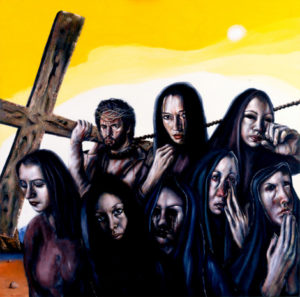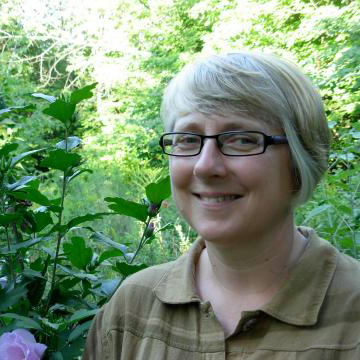[A meditation for Good Friday 2019 for St James, Fenelon Falls]
The women were there.
During the whole story
from start to finish,
the women were there.
The women were always there.
They washed his feet with their tears,
they anointed his feet with oil.
They provided food and drink.
They proclaimed him as messiah
in their villages.
They begged him for healing,
and touched the hem of his garment
knowing they would be made whole.
They were offered forgiveness,
raised from the dead,
given new life,
commended for their great faith.
Always
the women were there,
on the road,
in the villages,
in the wilderness.
Luke names three of them:
Mary, called Magdalene,
from whom seven demons had gone out,
Joanna, the wife of Chuza, Herod’s steward,
and Susanna.
And, Luke continues, many other women
also walked the road with him,
women who provided for Jesus and the disciples
out of their resources.
They were there.
They heard
the parables,
the sermons,
the calls to discipleship.
They heard the words of forgiveness
and the words of welcome.
They saw and heard
all of it.
And they were there in that upper room,
serving the meal,
listening to Jesus’ last words,
looking from face to face
for the signs of betrayal,
hearing the protests of the men
that they would never betray
their teacher, whom they loved.
The women were there in the garden.
And they were there
on Golgotha,
the women who had followed Jesus
all the way from Galilee.
We only know the names of six:
Mary Magdalen,
Joanna,
Mary the mother of James,
Salome,
Susanna.
But we know there were others.
They were there
when they nailed him to the tree.
They stood at a distance,
waiting, watching,
in grief and horror,
at the death of Jesus
whom they had cared for,
tended to,
fed,
and loved.
They stood at a distance.
All except one.
Mary, who feared no horror worse
than the death of her son,
stood close, at the cross.
Close enough for Jesus
to engage in one final
act of compassion
for his mother and his friend,
given to each other in their grief.
Mary, whose heart was now pierced
by the sword that Simeon had foretold
thirty-three years before in the temple.
Mary, whose journey as a mother
had begun in shame and distrust,
and whose journey as a mother was now ending
in shame and heart-twisting pain.
Mary and the other women,
united in their pain and their grief.
All of these women,
knowing that the path of love,
had taken them to the cross.
They were there
when the sun refused to shine.
And because they were there,
they also saw what happened next,
as the soldier pierced Jesus’ side.
They saw the blood and water flow mingled down.
They saw the limp body,
taken down,
handed over to Joseph of Arimethea.
They watched it wrapped in linen.
They were there when they laid him in the tomb.
And then they returned
to prepare spices and ointments.
They knew that the path of love
had not only taken them to the cross,
but that it would take them into the tomb.
They knew that there were things
that love and grief
enabled one to do.
They knew that even in death,
tenderness and care
could find a home,
that even in death
love would find a way to be expressed.
Did they also know,
that this was the story of their God?
Their God, who who had watched the death
of his hopes for what the people could be,
the one who mourned over their violence,
over their sin,
over their evil.
Did they know that God carried the grief
of sin and injustice
long before Jesus carried
that same violence and evil to the cross?
Did the women know
that in the midst of death,
God returned in Jesus and prepared
tender compassion, forgiveness and welcome
for those places of death
that seemed as brutal and cold as the tomb?
Did they know
that Jesus came to walk the path to the cross,
the path of pain and grief and suffering,
because of God’s deep love for us?
Did they know that Jesus died
because of God’s deep desire to call us home?
Maybe the women knew that,
maybe they didn’t.
But they did know how Jesus
had moved among them in compassion and love.
They knew how he had taught forgiveness and welcome.
And they knew that he did these things,
out of his own deep love for them,
his own deep grief for their sin.
It appears, at least, that the women knew this:
that the path of love
would take not only Jesus,
but them, too, to the cross.
And that in the midst of death,
love calls us to continue
the walk of compassion and care,
to prepare the spices
and the ointments.
That we might anoint death
with love.
Surround it with love.
Carry death, as God does,
as Jesus did,
with love.
Amen.

